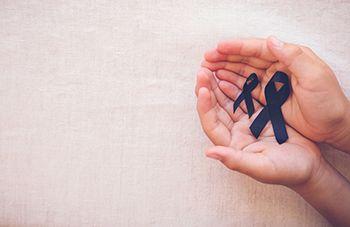Melanoma Awareness Month

Skin cancer is the most common cancer in the US, and each year there are more new cases of skin cancer than the combined incidence of breast, prostate, lung and colon cancer.
Skin cancer can affect anyone, regardless of skin color, gender, or age. In fact, one in five Americans will develop skin cancer during their lifetime. These facts may be alarming, but because skin cancer is mainly a behavioral disease, it is highly preventable.
About 86 percent of melanoma and 90 percent of nonmelanoma skin cancers are associated with exposure to the sun’s ultraviolet (UV) rays. That’s why embracing proper sun protection is critical all year round. The good news? Skin cancer can almost always be cured when it’s found and treated early. Communities, health professionals, and families can work together to prevent skin cancer or detect it early on.
Follow these Prevention Guidelines to stay sun-safe:
- Seek the shade (especially between 10 AM and 4 PM.)
- Do not burn.
- Avoid tanning and never use UV tanning beds.
- Cover up with clothing, including a broad-brimmed hat and UV-blocking sunglasses.
- Use a broad spectrum (UVA/UVB) sunscreen with an SPF of 15 or higher every day. For extended outdoor activity, use a water-resistant, broad spectrum (UVA/UVB) sunscreen with an SPF of 30 or higher.
- Apply 1 ounce (2 tablespoons) of sunscreen to your entire body 30 minutes before going outside. Reapply every two hours or immediately after swimming or excessive sweating.
- Keep newborns out of the sun. Sunscreens should be used on babies over the age of six months.
- Examine your skin head-to-toe every month.
- See your physician every year for a professional skin exam.
How can Melanoma/Skin Cancer Detection and Prevention Month make a difference?
- Encourage families to adopt good habits together, like wearing sunscreen and limiting their time in the sun.
- Motivate teachers and administrators to teach kids about the harm of UV radiation and why it’s important to protect yourself.
- Identify youth leaders in your community who can talk to their peers about taking steps to prevent skin cancer.
- Partner with a local hospital, state fair, or similar organization to host a skin cancer screening event.



